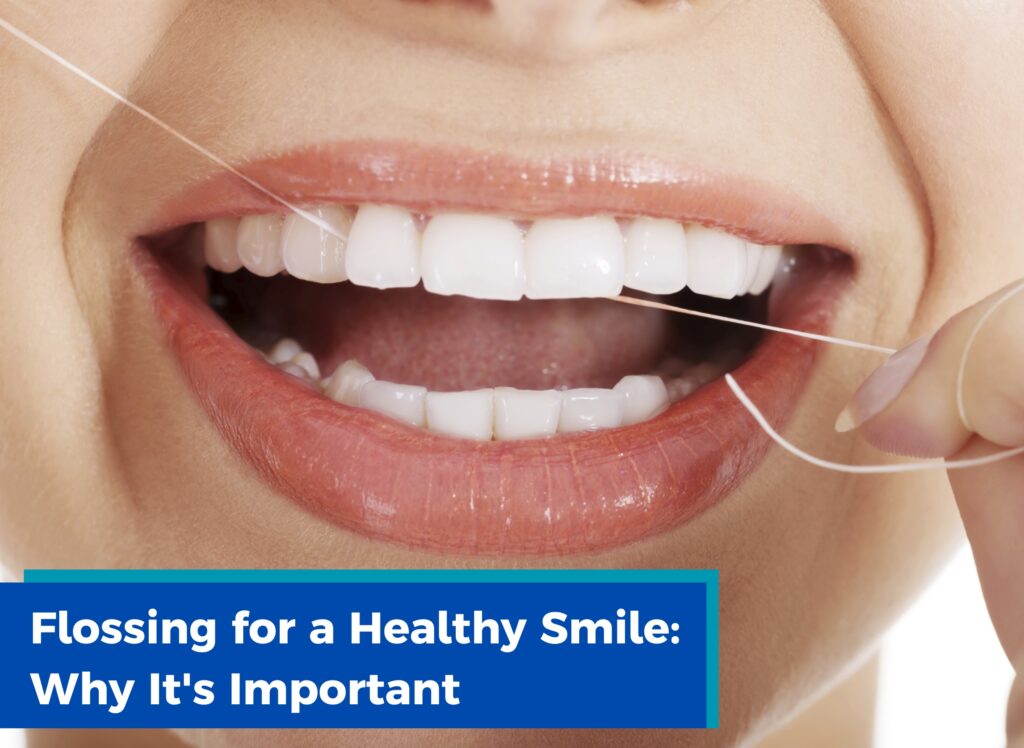Maintaining good oral health is essential for a bright and confident smile. While brushing your teeth is an important part of your daily dental care routine, flossing is equally crucial in ensuring optimal oral hygiene. Flossing helps remove plaque and food particles from areas that toothbrushes cannot reach, such as between the teeth and along the gumline. In this article, we will explore the significance of flossing for a healthy smile and why it should be an integral part of your oral care regimen. At Thind Dental Clinic in Ludhiana, we are committed to promoting excellent oral health practices, and flossing is a key aspect of our preventive dental care.
1. The Importance of Flossing
Flossing is a preventive dental care practice that involves using a thin piece of dental floss to clean the spaces between teeth and under the gumline. These areas are challenging to reach with a toothbrush, making flossing an essential step in removing plaque and debris that can lead to tooth decay and gum disease. When left unaddressed, plaque buildup can harden into tartar, which requires professional dental cleaning to remove. Regular flossing helps prevent plaque accumulation, contributing to better oral health and a reduced risk of dental issues.
2. Removing Plaque and Food Debris
Plaque is a sticky film of bacteria that forms on the surfaces of teeth. When plaque interacts with sugars and starches from the foods we consume, it produces acids that attack tooth enamel and lead to cavities. Flossing is an effective way to remove plaque from the tight spaces between teeth, where toothbrush bristles cannot effectively reach. By removing plaque promptly, flossing helps safeguard tooth enamel and prevents the development of cavities.
Moreover, flossing aids in dislodging trapped food particles between teeth. When food debris remains stuck, it can attract bacteria and lead to bad breath. Regular flossing helps maintain fresh breath by eliminating these food particles and reducing bacterial growth.
3. Preventing Gum Disease
Flossing plays a crucial role in preventing gum disease, also known as periodontal disease. Gum disease is a common condition characterized by inflammation of the gums caused by bacterial infection. When plaque accumulates along the gumline, it can irritate and inflame the gum tissues, leading to gingivitis, the early stage of gum disease. If left untreated, gingivitis can progress to periodontitis, a more severe form of gum disease that can cause gum recession and even tooth loss.
Flossing helps remove plaque from the gumline and prevents it from hardening into tartar, which is a significant factor in the development of gum disease. Regular flossing, in combination with proper brushing and regular dental check-ups, can help keep gums healthy and reduce the risk of gum disease.
4. Maintaining Oral Health for a Lifetime
Early adoption of proper oral hygiene practices, such as flossing, lays the groundwork for a lifetime of beautiful smiles. Teaching children proper flossing techniques and encouraging them to floss regularly can instill valuable dental care practices that will benefit them throughout their lives. Consistent flossing helps preserve the health of teeth and gums, reducing the need for extensive dental treatments and potentially saving on dental costs in the long run.
5. Flossing Techniques
Using the correct flossing technique is essential to ensure maximum effectiveness and avoid injury to the gums. Here’s a step-by-step guide to proper flossing:
a. Start with approximately 18 inches of dental floss and wind most of it around your middle fingers. Leave about 1-2 inches of floss to work with.
b. Using a back-and-forth motion, gently enter the floss between your teeth while holding it tightly between your thumbs and forefingers.
c. Gently move the floss under the gumline while forming a C shape against the side of one tooth. Be cautious not to snap or force the floss, as this can harm the gums.
d. Slide the floss up and down along the tooth surface to remove plaque and debris. Utilizing a fresh piece of floss for each tooth, repeat this procedure for each one.
e. As you move between teeth, use a new section of floss to avoid spreading plaque from one tooth to another.
6. Flossing Tools
Various flossing tools are available to cater to individual preferences and needs. Traditional dental floss is a common and effective option, but there are other alternatives, including:
a. Dental Picks: Dental picks, also known as interdental brushes, are small brushes designed to fit between teeth. They are ideal for individuals with braces or larger gaps between teeth.
b. Floss Picks: Floss picks are small plastic tools that hold a short piece of dental floss. They are convenient for people who find traditional flossing challenging.
c. Water Flossers: Water flossers, also called oral irrigators, use a stream of water to remove plaque and debris between teeth and along the gumline. They are gentle on the gums and can be beneficial for individuals with gum sensitivity.
7. Incorporating Flossing into Your Daily Routine
Flossing should be part of your daily oral care routine, along with brushing your teeth at least twice a day and visiting your dentist regularly for check-ups and cleanings. Making flossing a habit can significantly improve your oral health and contribute to a beautiful, healthy smile. If you are unsure about the right flossing technique or the most suitable flossing tool for your needs, consult your dentist or dental hygienist for guidance.
Conclusion
Flossing is a simple yet vital practice that can make a significant difference in your oral health. By regularly removing plaque and debris from between your teeth and along the gumline, flossing helps prevent tooth decay, gum disease, and other dental issues. It is an essential component of a comprehensive oral care routine that ensures healthy teeth and gums for a lifetime. At Thind Dental Clinic in Ludhiana, we emphasize the importance of flossing to all our patients and encourage them to adopt this beneficial habit for a healthy smile.
For additional information or to arrange an appointment with us
You can contact us at +91-92568-92568
or visit us at:
THIND DENTAL CLINIC
11-12-13, 14 H.I.G Market, Opposite Water Tank, Ludhiana, Punjab 141010.
Also Read:
Single Sitting Procedure: Painless and Affordable Dental Care at Thind Dental Clinic
Dental Care for Children: Expert Tips for Parents on Caring for Your Child’s Teeth
The Importance and Benefits of Regular Dental Checkups: Ensuring Optimal Oral Health
Professional Dental Implants: Restoring Smiles with Precision and Care at Thind Dental Clinic in Ludhiana

 Timings
Timings


